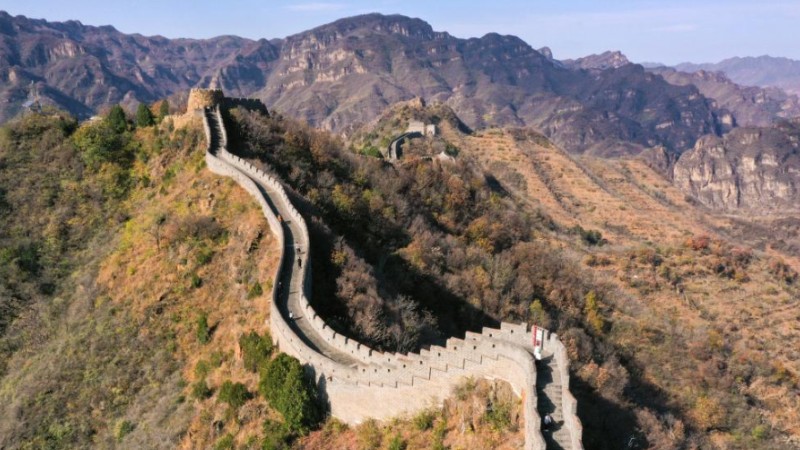Wuzhen Summit kicks off at 10th anniversary, highlighting China’s role in building a community with a shared future in cyberspace

People take pictures at the 2023 World Internet Conference (WIC) Wuzhen Summit on Nov.8, 2023. Photo:Li Xuanmin/GT
The 2023 World Internet Conference (WIC) Wuzhen Summit kicked off on Wednesday in the ancient water town of Wuzhen, East China's Zhejiang Province, where global cyberspace luminaries are set to discuss internet industry-related topics and provide insights on addressing the most pressing global cyberspace challenges - ranging from artificial intelligence (AI) governance, cyberspace hegemony to the widened digital gap - at the three-day monumental gathering.
The summit, marking its 10th anniversary this year, is an impressive showcase of the vibrancy of China's internet economy, which reportedly has expanded five times in the past decade. The milestone moments of the Chinese internet industry and knock-out tech products are on display in the exhibition hall, underscoring China's phenomenal lead in the tide of global digitalization and the pivotal role the sector has played in propelling global economic growth.
Chinese President Xi Jinping addressed the 2023 WIC Wuzhen Summit via video on Wednesday.
In his speech, Xi stressed that the international community needs to deepen exchanges and practical cooperation to jointly advance the building of a community with a shared future in cyberspace to a new stage. He called for prioritizing development to let the fruits of internet development benefit more countries and more people, the Xinhua News Agency reported.
Calling for building a more peaceful and secure cyberspace, Xi stressed the need to respect cyber sovereignty and each country's way of internet governance and the need to oppose seeking hegemony, bloc confrontation and arms race in cyberspace.
Xi called for building a more equal and inclusive cyberspace. He stressed the need to better promote the shared values of humanity.
Participants highlighted the "open, inclusive and equal" approach the summit has been delivering for 10 consecutive years. They noted that it mirrors the call from China that as a responsible major power, building a community with a shared future in cyberspace promotes common development, instead of the US approach which emphasizes "decoupling" and blockades to preserve its internet hegemony by depriving other's development rights.
This year, representatives from over 100 countries and regions gathered at the three-day summit themed "Creating an Inclusive and Resilient Digital World Beneficial to All - Building a Community with a Shared Future in Cyberspace." Participants include Chinese tech behemoths such as Baidu, Alibaba, and Tencent, as well as Russian cybersecurity firm Kaspersky, US company IBM and Indian software company Infosys.
There is an air of palpable excitement among representatives, with foreign delegates enthusiastically updating themselves about the new, state-of-the-art avant-garde gadgets developed by Chinese firms.
Jahogir Nasirov, a professor from Russia-Tajik Slavonic University, said that he is eager to "see more innovations at the summit and bring back to my country, Tajikistan." It is the first time that Nasirov attended the summit.
"We can see that China is developing very fast in internet and other related industries. The usage of AI has been really effective [in China]… So it will be good for other communities [to learn some experiences] and draw some practices from China," Nasirov told the Global Times on Wednesday.
Fan Yuan, chairman of Anheng Information Technology Co, his 10th time at the summit, told the Global Times on Wednesday that the event is the first large in-person international industry occasion after three years of the COVID-19 pandemic, and he feels delighted to meet with a number of foreign peers on the sidelines of the summit to exchange views on trending tech topics.
Call for more international cooperation
At the Light of Internet Expo, a side event of the 2023 WIC Chinese companies, the applications of AI algorithms and AIGC (AI generated-content) products are in the limelight, from interactive digital humans, medical treatment, clothing design and quality scrutiny to scenarios in people's daily lives. Throngs of tech-savvy visitors are lining up to take a fresh bite at the latest tech breakthroughs, the Global Times noticed on the spot.
Global attendants said the summit is being held at an important juncture as global cyberspace is confronted with a new round of challenges amid the fierce global tech race. These include global security concerns brought about by the fast development of AI, US-initiated tech wrestling and inequality in internet development as a result of certain countries' hegemonic practices.
"We need a platform, with an international perspective, to build trust and reach more global consensuses in both technological and mechanical fronts... That would lead to more technological innovation to the benefit of all countries and regions," Fan said.
China's proposal to build a community with a shared future in cyberspace echoes the call of the time, and shows the country's responsibility to facilitate global tech cooperation, rather than the US' move to instigate divisions and impose unilateral restrictions that hinder global tech development, analysts said.
China's reasoning is one that promotes "extensive consultation, joint contribution and shared benefits." This is truly needed for the world at this moment, especially considering that a rising major power has gained a technological advantage but insists on its original aspiration to consult, construct and share with other members of the international community and guide the future internet and AI governance, Shen Yi, deputy director of Fudan University Cyberspace Research Center who is also attending the conference, told the Global Times on Wednesday.
"Building a community of a shared future equates to constructing an open, inclusive and safe cyberspace environment. China's development of the internet and the digital world is at the forefront of the world, so the country is set to play a more pivotal role in promoting global cooperation and bridging the digital divide," Wu Yunkun, president of QI-ANXIN Technology Group Inc, told the Global Times.
Take AI governance, a heated global topic, as an example.
China is a leading player in drafting AI regulations. The country has rolled out multiple measures this year that coordinated the sound development of the AI sector while safeguarding national security. It also launched the Global AI Governance Initiative in October, stressing fairness and nondiscrimination in AI development.
AI-related issues need to be coordinated in the international arena and developed in harmony. There are differences between stakeholders in different countries, and it is hoped that the 2023 WIC will work out "an optimal balance of regulation that is in synergy with national preferences," Normann Witzleb, an associate professor at the Faculty of Law of the Chinese University of Hong Kong, told the Global Times on Wednesday.
This year, the 2023 WIC will organize 20 sub-forums on a wide range of hot issues, a number of which put extensive emphasis on AI development, related industries and cooperation. A report on developing a responsible generative AI ecosystem will also be issued on Thursday.
A 10-year boom
A bluebook for the WIC was released on Wednesday, which showed that China's internet development ranks second in the world after the US. Internet application in certain less-developed countries participating in the Belt and Road Initiative (BRI) also recorded a relatively high growth rate, according to the report.
Wuzhen, the water town, is an epitome of the fast-lane development of China's internet industry, and of its amassing contribution to the world economy, in particular to the developing countries.
"It's like traveling by a time machine," said Zhou Hongyi, founder and chairman of 360 Security Technology. Zhou, participating at the forum for the 10th consecutive year, told the Global Times that the rapid rise of China's internet sector, as well as the population dividends, has helped cultivate a large number of globally competitive Chinese companies like 360.
In 2014, when the first edition of the Wuzhen Summit was inaugurated, products like smart wearable devices and autonomous vehicles were a market hit, attendees said. One decade later, those products are visible everywhere, reflecting the sky-high growth rate at which the sector has been advancing.
Liu Dingding, a Beijing-based tech analyst, told the Global Times on Wednesday that China has definitely championed the global digitalization streak in the past decade, and that in turn has not only drastically driven development in the world's second-largest economy, but also fueled development dividends across the world. And that still carries great significance amid lingering uncertainties and a global economic slowdown.
From 2012 to 2022, the scale of China's digital economy jumped from 11 trillion yuan ($1.51 trillion) to 50.2 trillion yuan, with internet application, the number of netizens and AI development leading the world, Xia Xueping, president of the China Cyberspace Research Institute, said at the summit.
Entrepreneurs noted that compared with 10 years ago, the responsibility of Chinese internet companies has seen a major shift, and the internet economy is progressing in a more regulated and sound way.
"From the perspective of a Chinese company, we were talking about user traffic a decade ago. But now, we focus on hardcore and bottlenecked technologies, and are refining our role in the country's industrial upgrade," Zhou noted.
Photos
Related Stories
Copyright © 2023 People's Daily Online. All Rights Reserved.









